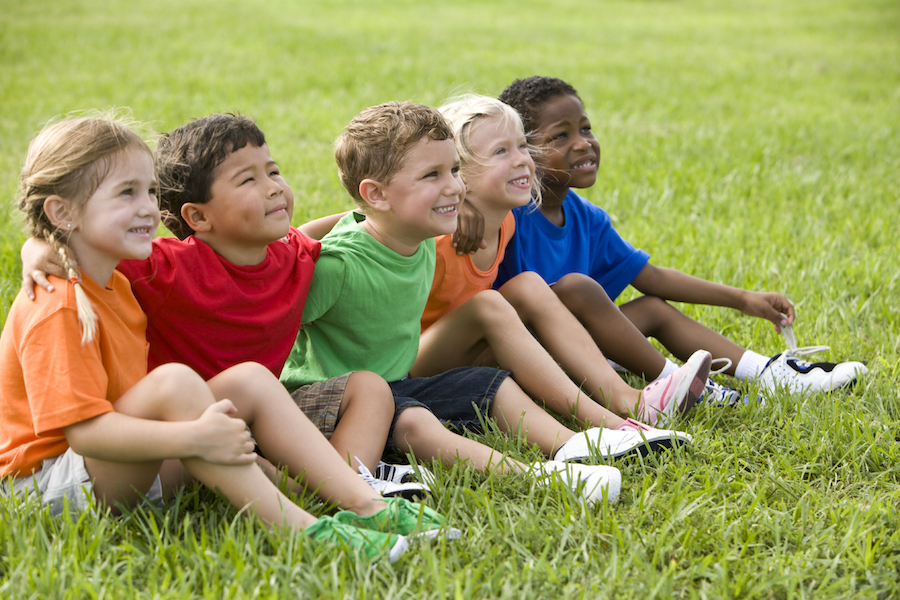Making Caring Common Shows Us How to Raise Caring, Ethical Youth in Today’s Social Climate

Diverse 5 and 6 year old children sitting together side by side, best friends
The notion to elevate the emotional intelligence of today’s youth was the goal for Richard Weissbourd and Stephanie Jones, faculty at the Harvard Graduate School of Education, when they founded Making Caring Common in 2012. The program utilizes research, expert guidance, and the insights of both practitioners and parents to give schools and parents concrete, engaging strategies for raising caring, ethical children.
Q&A
Making Caring Common helps educators, parents, and communities raise children who are caring, responsible to their communities, and committed to justice. The Making Caring Common team is led by Richard Weissbourd, a psychologist, senior lecturer at Harvard, and author of The Parents We Mean to Be: How Well-Intentioned Adults Undermine Children’s Moral and Emotional Development, and includes staff members with backgrounds spanning research, teaching, communications, and community engagement.
2. Why is it so important to raise emotionally intelligent kids now more than ever?
Any healthy civil society depends on adults who not only have emotional intelligence but are committed to their communities and who, at pivotal times, will put the common good before their own. And yet we don’t seem to be preparing large numbers of youth to engage with and sustain this society.
In fact, to a degree that may be unprecedented in our history, our culture appears to have elevated personal success—both achievement and happiness—as the primary goal of child-raising, while demoting concern for others and the common good.
In our 2013 survey, The Children We Mean to Raise, almost 80 percent of the 10,000 youth surveyed identified high achievement or happiness as their top priority, while only 20 percent selected caring for others. Youth were almost three times as likely to report that their parents would be more proud of them if they received good grades than if they were caring members of their class and school. We also found that while parents told us that raising caring children is their top priority, a large majority of their children view their parents as prioritizing achievement or happiness over concern for others.
3. What are some of the issues the program touches upon and how has this evolved over the years?
Over the years, our research has focused on:
- The disconnect between what parents say they value and what kids actually hear
- The leadership bias teen girls face
- How to reshape the college admissions process to promote greater ethical engagement among aspiring high school students
- Young people’s experience with sexual harassment and misogyny – and how adults are failing to have important conversations that could prevent sexual harassment and misogyny
We also work closely with schools, support student leaders, and lead national communications campaigns to add our voice to the conversation about child-raising.
Our initial work focused primarily on middle and high schools. We are now seeking more actively to both reach large numbers of parents and to influence what key institutions, such as colleges, signal to young people about what our society values.
4. How is the program now aligning with current topics in the news (#metoo, #neveragain movement)
Our research on harassment, misogyny, and leadership bias has perhaps never been more relevant. For example, in our recent national survey of 18 to 25-year-olds, 87 percent of women reported having experienced sexual harassment yet 76 percent of respondents to this survey had never had a conversation with their parents about how to avoid sexually harassing others. Seventy percent of respondents wished they had received more information from their parents about some emotional aspect of romantic relationships.
The good news is that, because most parents and educators don’t seem to be engaging young people in meaningful conversations about mature relationships or misogyny and harassment, there is substantial room for improvement. We know that parents and educators often need help starting – and sustaining – these conversations, so we have developed and are sharing tips, toolkits, and other resources as an important part of our work.
Making Caring Common also works directly with schools to promote caring school environments. Network schools use our original, research-based strategies to promote empathy and to reduce problem behaviors, including bullying and sexual harassment. Student leaders from across the country collaborate with Making Caring Common on projects to make their schools kinder and more inclusive.
5. Can anyone become involved with Making Caring Common
There are many ways for parents and educators to get involved with Making Caring Common! Earlier this month, we launched the Caring Schools #CommonGood campaign, which is mobilizing high schools and middle schools across the country to support young people in creating a better world. Parents can share information with their children’s schools; educators can learn more and commit to take action.
We also put out a monthly newsletter, which includes other opportunities to get involved, such as applying to our Youth Advisory Board, joining our Caring Schools Network, and participating in research studies. You can also find Making Caring Common on Facebook and Twitter.
You can also go to the Making Caring Common website at mcc.gse.harvard.edu.
READ MORE STORIES THAT MOVE HUMANITY FORWARD
READ MORE STORIES THAT MOVE HUMANITY FORWARD
SIGN UP FOR MARIA’S SUNDAY PAPER


